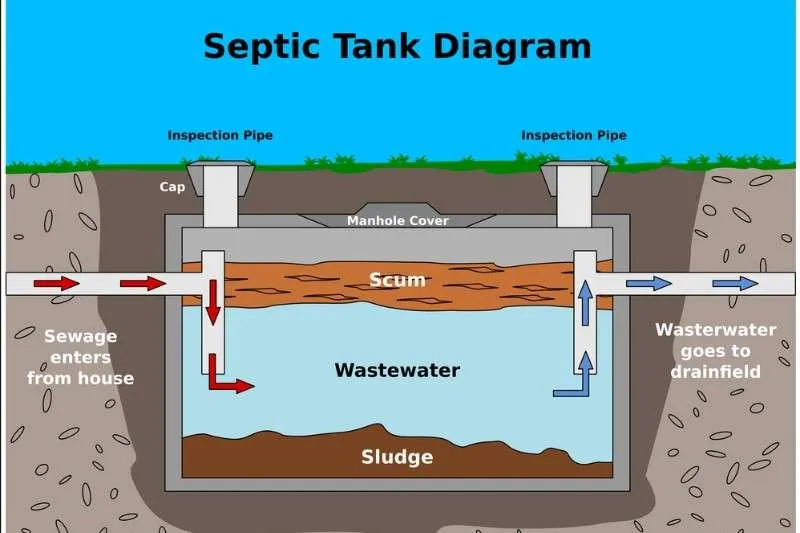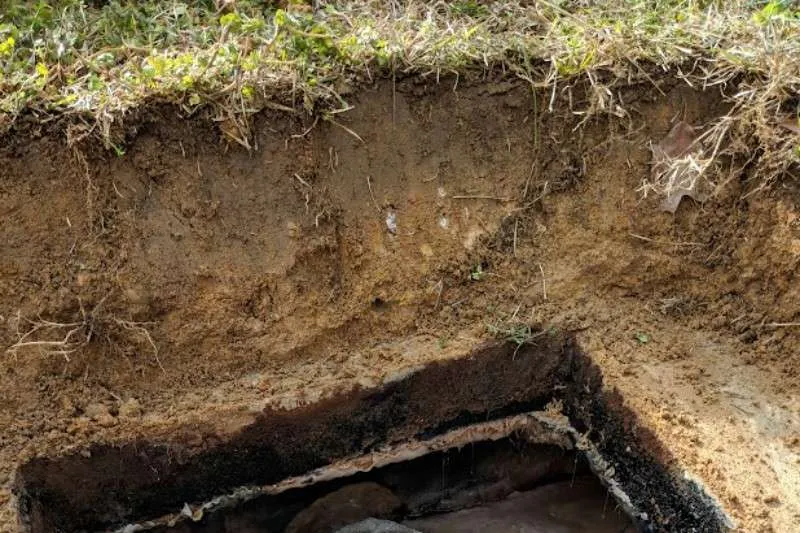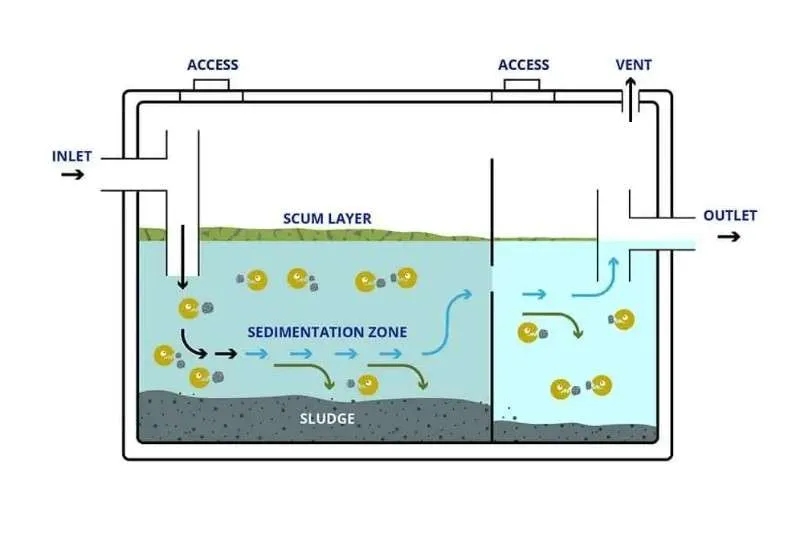Are you having trouble with a clogged or slow-draining septic tank? Grease build-up is a common problem for many homeowners and can be hard to eliminate.
Fortunately, there are several solutions that you can use to dissolve grease in your septic tank quickly and effectively. Not only will this help unclog any potential backups, but it will also help maintain the health of your system by removing dangerous bacteria.
In this blog post, we’ll look at the best ways to dissolve grease in septic tanks safely and easily so you can keep your household running smoothly! Keep reading to learn more!
Introduction to Septic Systems: Basic Overview and Functioning of the septic system.

Septic systems are an important part of many households, providing the necessary wastewater treatment for any building not connected to a municipal sewage system. A basic residential septic system consists of a tank, soil absorption system, and surrounding drain field.
Waste enters the tank, separating into three layers: solids at the bottom, scum in the middle, and effluent on top. The effluent is sent to the soil absorption area, which percolates through gravel before entering the groundwater supply.
Maintaining your septic tank systems is important to ensure optimal performance and prevent clogs or backups caused by grease buildup.
The Problem with Grease: How It Affects Septic Systems.
Grease can clog the pipes and cause backups in the system. This can lead to septic system failure and cause costly repairs that may take a long time to complete, inconveniencing you and your family.
A grease trap can also promote the growth of bacteria. Bacteria thrive in warm, dark environments; when grease builds up, it creates an ideal environment for bacteria to grow. This can result in foul odors from your septic tank and potential health risks from contact with harmful bacteria.
Finally, grease buildup can reduce the efficiency of your septic system. If enough grease accumulates, it will block water flow and prevent wastewater from draining properly. This could even damage your septic tank over time!
The Risks of Allowing Grease to Accumulate in Septic Tanks.

Clogs
Grease build-up can cause clogs in your septic system, leading to serious plumbing problems that can be difficult and costly to address. If left untreated, the clog may worsen over time, resulting in a complete blockage of the drains or even wastewater backups into your home.
Bacterial Growth
When grease traps accumulate in your septic tank, it provides an ideal environment for bacteria to grow and multiply alarmingly. This can create dangerous toxins that could eventually enter drinking water if not addressed quickly.
Environmental Pollution
Grease and fat liquid layer buildup in septic tanks is also hazardous to the environment as it can contaminate groundwater and lead to water pollution. This can be especially damaging to rivers and lakes, where toxins quickly spread into larger bodies of water.
Damage to Septic System
Allowing grease to accumulate in your septic tank can also damage the system, leading to costly repairs or replacements. It is important to address any buildup quickly and effectively to avoid long-term damage.
Methods for Dissolving Grease in Septic Tanks: Chemical vs. Natural.
When it comes to dissolving grease in a septic tank, there are two main methods: chemical and natural.
Chemical solutions
Chemical solutions involve commercial products containing sodium hydroxide (lye) or sulfuric acid to break down grease and fats. These chemical drain openers products are usually found at hardware stores or online and can be applied directly to the septic tank.
Although they may be effective at getting rid of stubborn grease, they also come with some potential risks, so it’s important to read all instructions carefully before use and follow them precisely.
Natural solutions
Natural solutions involve using items you likely have around your home, like boiling water, vinegar, baking soda, or dish soap. Boiling water helps to loosen the grease from surfaces and can help to break down any hard-to-reach clumps.
Vinegar has many natural cleaning properties that can also help dissolve grease, as does baking soda, which helps to absorb odors and grime. Lastly, dish soap contains enzymes that act as a natural degreaser and help lift the grease from your septic tank walls.
Chemical Products for Dissolving Grease in Septic Tanks: Pros and Cons.
When dissolving grease in septic tanks, some homeowners turn to chemical products. While these can be effective solutions for quickly unclogging stubborn build-ups, there are also a few things to consider before using any chemical product.
One benefit of chemical substances called lipids is that they work quickly and effectively to dissolve the grease, so you don’t have to wait very long for results. However, this same speed means that you should use caution when handling them as they can be caustic and dangerous if not handled properly.
Additionally, these products can also cause damage to your tank or other plumbing components if used incorrectly or too often.
It’s important to read all directions carefully before using any chemical product for dissolving grease in septic tanks. It’s also wise to contact your local plumbing or septic professional, who can advise and assist with safely applying these products.
With the right precautions, chemical products are effective solutions for quickly unclogging buildup in your septic tank system.
Natural Methods for Dissolving Grease in Septic Tanks: Pros and Cons.
Several methods are available if you’re looking for an approach to dissolving grease septic tank naturally. The most popular options include baking soda, vinegar, and enzymes that can help break down grease buildup.
Using baking soda is inexpensive and can effectively break down grease. However, it may require multiple applications to get the job done thoroughly. Applying too much baking soda can damage your septic tank over time if not used correctly.
Vinegar can also dissolve grease in your septic system, but it will take longer than other methods and won’t penetrate deep within your system’s pipes like more powerful products. Additionally, vinegar can be quite smelly and may not be suitable for some households.
Finally, enzymes are the most effective method for dissolving grease in septic tanks. Enzymes are designed to break down organic matter like grease but require regular maintenance to ensure your tank remains in good working order. While this is more expensive than baking soda or vinegar, it typically yields better results and is less likely to damage your system over time.
Best Practices for Preventing Grease Buildup in Septic Tanks.

- Avoid pouring garbage disposal fats, oils, and grease (FOG) down the drain at all costs. These substances can congeal and solidify in pipes over time, resulting in clogs and backups.
- Clean kitchen sinks regularly with a non-abrasive cleaner designed to cut through grease build-up. This will help prevent blockages from occurring in the first place.
- Install septic tank risers or other devices that allow easy access for regular inspections and maintenance of your septic tank system.
- Consider regularly using septic tank additives to help break down any FOG in the septic tank.
- Use an enzyme-based cleaner in the septic tank to help dissolve any FOG and other organic matter that can accumulate over time.
- Have your septic tank pumped regularly to ensure any buildup is removed and not allowed to accumulate.
- Ensure your home has adequate ventilation to prevent backflow from occurring, which can cause blockages and backups in the system.
- Perform regular maintenance of pipes, fixtures, and the entire drainage system to ensure smooth operation for years.
FAQs
What will breaks down grease in a septic tank?
Enzymes are a great solution for breaking down grease in a septic tank. Like fats and oils, enzymes are natural proteins that break down organic matter.
Does Ridex dissolve grease?
Ridex is a popular enzyme-based product that dissolve grease molecules in septic tanks. It’s a powerful blend of natural enzymes and bacteria that help break down grease and other organic materials quickly and effectively.
Does a septic tank decompose grease?
Septic tanks do not decompose grease on their own. Grease will accumulate over time and cause clogs or backups in the system. To prevent this, you must use an enzyme-based product like Ridex to dissolve grease in your septic tank.
What chemical dissolves grease in sewer pipes?
Various chemicals can be used to dissolve grease in sewer pipes. Sodium hydroxide (caustic soda) is the most commonly used, but enzyme-based cleaners like Ridex can help break down grease more effectively and safely.
What enzyme breaks down grease?
Enzymes like protease, lipase, and amylase are known for breaking down different types of grease. Proteases break down proteins, lipases break down fats and oils, and amylases break up starches.
How do you dissolve something in a septic tank?
To dissolve something in a septic tank, you must use an enzyme-based cleaner like Ridex. This product contains natural enzymes and bacteria that help break down grease and other organic materials quickly and effectively. Mix the product with water and pour it into your tank for quick results.
What is the best solvent to dissolve grease?
Enzyme-based cleaners like Ridex are the best choice for dissolving grease in septic tanks. They contain natural proteins that break down organic matter and are safe to use around your home.
What eats sludge in a septic tank?
Various microorganisms are responsible for breaking down and decomposing sludge in septic tanks. These microorganisms are often found in enzyme-based products, which help break down grease and other organic materials quickly and effectively.
Conclusion
Grease buildup in septic tanks can incredibly damage the system and its functionality. Without proper maintenance and attention, it could lead to tragic results no one wants to experience. To prevent these risks and issues, it is imperative to dissolve grease in septic tanks immediately. Chemical and natural methods are available, with varying pros and cons. Ultimately, the path chosen depends on personal preference. However, best practices include regularly managing your tank levels and avoiding pouring or flushing substances that may clog or build up over time.


